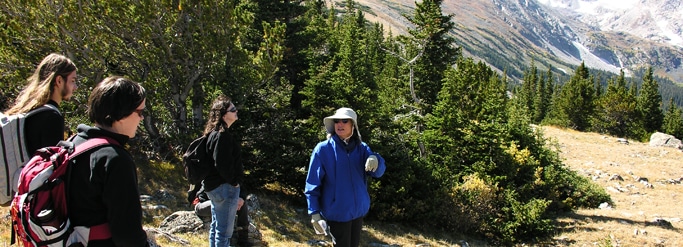Academics & Sustainability Education

“Inspired by the UN Brundtland Report’s definition of sustainable development, we define sustainability in education as education for a lifestyle that meets the needs of the present without compromising the ability of future generations of all species to meet their needs. (In this, we note the difference between ‘needs’ and ‘desires.’)
In accordance with the Naropa University Mission Statement, using contemplative, intellectual, and practical methods, faculty help students gain the necessary inner and outer tools and perspectives to engage courageously and compassionately with a complex and changing world. We aspire to teach students across all disciplines to engender a restorative, regenerative, and healthy approach to relationships between humans and the rest of the living, natural world. Our ultimate goal is the co-creation of a just, sacred, and sustainable society.” — Naropa University Faculty Teaching and Learning Commitment
Environmentally Focused Programs
Recent Faculty "Green Papers"
Nurturing a Culture of Possibilities by Sherry Elms MA and Leila Bruno
Transformative Learning and Sustainability by Anne Z. Parker PhD and Mark D. Wilding MA
"We Ain't Got No Wildlife Here": Transformative Effects of a Contemplative Assignment in Ecoliteracy by Tina R. Fields, PhD
Core Curriculum
To further align our curricula with Naropa’s Institutional Gateways, in Fall 2019 we will offer our first BA Core Sustainability seminar, Regenerative Community in Action.
During fall 2012 semester, Naropa’s faculty senate, Cauldron, approved the inclusion of sustainability in Naropa’s curricular arc. The outcomes are as follows:

Skillfulness in Addressing Diversity and Ecological Sustainability
Graduates are able to think critically and analytically about social and cultural diversity; they recognize the interconnectedness of the human community to ecological sustainability and cultivate sustainable practices.
Ecological Relationships and Sustainability Awareness
- Introductory: Students demonstrate an understanding of principles of ecological interrelationships, including living systems, complexity and interdependence. They appreciate the need to live with awareness and respect for one’s self, the earth and its inhabitants, human and nonhuman. Students understand the dynamics and significance of the ecological crisis and what is meant by different kinds of sustainability.
- Intermediate: Students express connections between their academic work and personal, global, and local sustainability. They understand sustainability as an expression of appreciation for the sacredness of the earth and contemplative principles in action.
- Capstone: Students integrate and apply a high level of understanding of different kinds of sustainability into their academic work, creative expression and community service.
Diversity and Systems of Privilege and Oppression
- Introductory: Students express personal beliefs and assumptions and explain systems of privilege and oppression at the local, national and global levels. They interpret the intersectionality of identifiers such as race, ethnicity, sexual orientation, gender, age, ability, and socioeconomic class and how they shape individual and collective identities.
- Intermediate: Students exhibit the ability to hear, connect, empathize with, and engage the different voices and stories that shape diverse human’s experiences.. Students investigate the intersectionality of diversity, ecological sustainability, academic endeavor and participatory solutions within their major and intended vocation. Students raise questions about inclusiveness, privilege and oppression in their academic work.
- Capstone: Students extend their academic inquiry to hear, connect, empathize with and engage the diverse voices and stories that shape experience. Students incorporate an understanding of the impact of privilege and oppression in their academic work. They further evaluate their own assumptions and the assumptions of their field in light of these concerns. Students appreciate the role of diversity in their academic and creative process.


